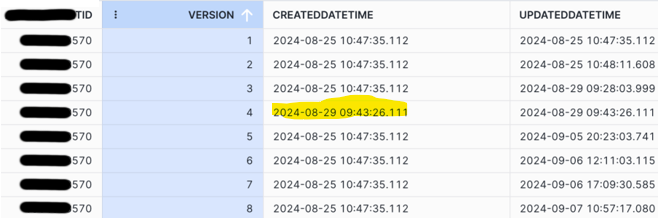Dan Stace
2024-09-18
This is a true story. At the request of the models involved in this event, the names have been changed.
Problem
A Widget transitioning from Off to On caused a new creation timestamp to be generated, and applied only to a single WidgetVersion record. This had apparently been happening for many years, causing consternation within the reporting team.

The cause puzzled many engineers, because all other Widget updates carry the timestamp forward correctly via this code:
public sealed partial class Widget
{
public WidgetVersion AddWidgetVersion()
{
var firstWidget = WidgetVersions.FirstOrDefault(x => x.Version == 1);
var widgetVersion = new WidgetVersion
{
Version = (WidgetVersions.FirstOrDefault(x => x.IsLatest == true)?.Version ?? 0) + 1,
CreatedDateTime = firstWidget?.CreatedDateTime ?? SystemClock.UtcNow
}
}
}
Solution
When querying for an existing WidgetVersion with a given DongleId, only a single WidgetVersion was being loaded by EF. I simply had to ensure all earlier versions were also being loaded:
internal IQueryable<WidgetVersion> BuildQuery(IQueryable<WidgetVersion> efq, long dongleId)
{
return efq.Where(x => x.DongleId == dongleId && x.IsLatest == true)
.Include(x => x.Widget)
+ .Include(x => x.Widget.WidgetVersions);
}
By loading all existing WidgetVersion records for a given DongleId, we can be sure that the Version 1 record exists in the Widget.WidgetVersions collection and can be located via FirstOrDefault(x => x.Version == 1). This code now works as expected:
var previousWidgetVersion = BuildQuery(_dbContext.Set<WidgetVersion>()).FirstOrDefault();
var saveWidget = previousWidgetVersion.Widget;
saveWidget.AddWidgetVersion();
_dbContext.Update(saveWidget);
_dbContext.SaveChanges()